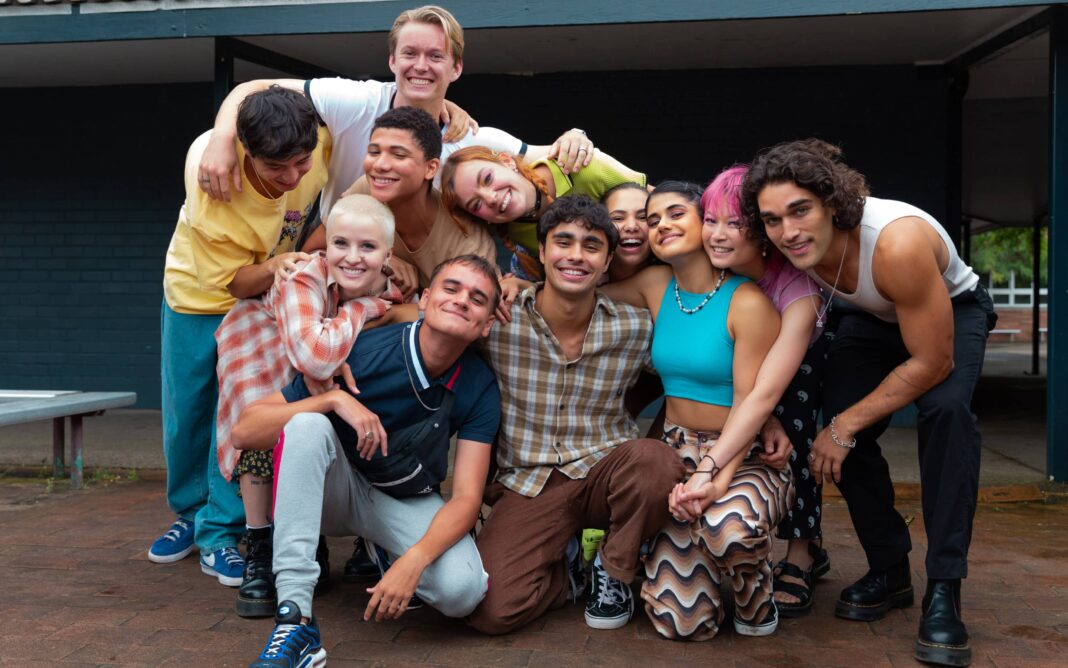
The cast of Netflix’s Heartbreak High remake is even more diverse than the original. Photo: Netflix.
We’ve all had that feeling – you pick up a favourite childhood book or switch on a classic movie only to find yourself cringing regularly at all the things contained within it that don’t really age well.
It might be casual racism or sexism, gender stereotypes or references to people’s appearances, abilities, etc. It’s rare to find a classic from decades ago that doesn’t fall foul of today’s standards when it comes to inclusivity, equality and diversity.
We’ve seen plenty of remakes over the years, which take a much-loved piece of culture from the past and recreate it with today’s expectations and standards incorporated. I’m thinking of the all-female remakes of classic films like Ghostbusters and Oceans 11, or Netflix’s remake of The Baby-Sitter’s Club to include more diversity and redress gender expectations (though I will say the original books were ahead of their times in many ways), or the new Heartbreak High which has a really diverse cast and takes a close look at issues around gender, sexuality, race and disability with a level of empathy and nuance that is very in line with contemporary audiences.
Viewers have generally welcomed these remakes, but what about returning to classic works of literature and editing them to remove language and references we now recognise as discriminatory or prejudiced?
Recently, it’s been announced that Roald Dahl’s publishers are working through his canon of children’s books with a team of sensitivity readers and editing out language and references that are considered inappropriate or discriminatory.
For example, removing descriptions that link characters who are evil or nasty with being ‘fat’ or ‘ugly’ or taking the word ‘black’ out of descriptions where it is used to connote something negative. The thinking behind this is that young readers need to read content that aligns with social values and that these references could be confusing or reinforce negative attitudes.
After these proposed changes were announced, all hell broke loose.
Many readers felt like it was censorship to change the original language Dahl wrote, and made the point that literature is art and reflects the time in which it was created, while Dahl’s choice of language doesn’t stack up against our progressive values today, at the time it was widely accepted.
Others, however, argue that it’s important we reflect the growth and change in our social understanding of equality with the content we consume. Given these books are still in high circulation, adjusting them to meet modern standards is necessary, especially given the target audience’s age.
I feel very conflicted about this.
In general, I am always in favour of ensuring the language and attitudes we promote in art and culture are aligned with principles of equality and inclusion. I’m quick to call out new books, TV shows, movies and music that promote discriminatory or prejudiced attitudes – but when I think about applying that lens retrospectively to literature created in the past and when the author is no longer able to weigh in on the topic, it doesn’t feel quite right.
As a child, reading Roald Dahl’s books (which I loved), I was always encouraged to talk about what I was reading and to discuss it with my parents. There was an opportunity, then, for us to unpack things like the fatphobic or casually racist elements in the books and to talk about them. In that way, I was both learning about the standard in the past and how that was changing in the present.
Part of me feels that the way to address this gap between what Dahl’s works convey and what we now accept is to have those conversations with children reading the books, not to cushion them from the reality of history.
And importantly, changing the works would also mean erasing the historical artefact of the original texts, which have had a massive impact on readers worldwide.
But is retaining the works as is to the detriment of progress? Is it potentially damaging for young readers to read content that reinforces offensive attitudes that they may still come into contact with in real life?
In the end, the backlash to the proposed edits was so great that the publisher announced they will be releasing Dahl’s original works as written, as well as a new edition of his books with the adjustments made by sensitivity readers, leaving the choice up to the consumer.
The conundrum now is, which one do you choose?
Original Article published by Zoya Patel on Riotact.








